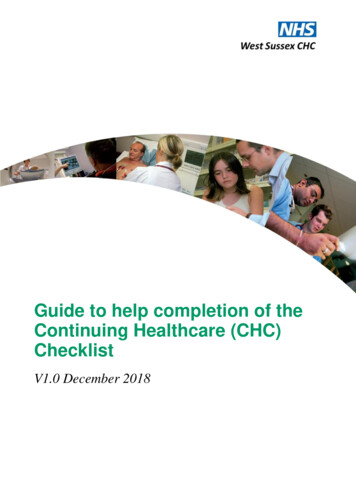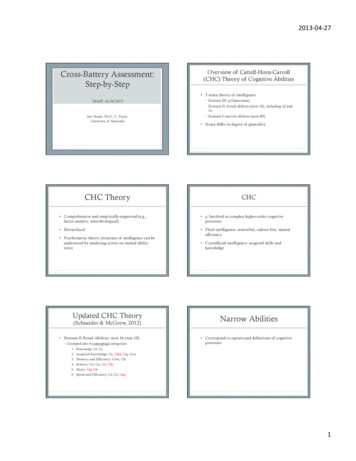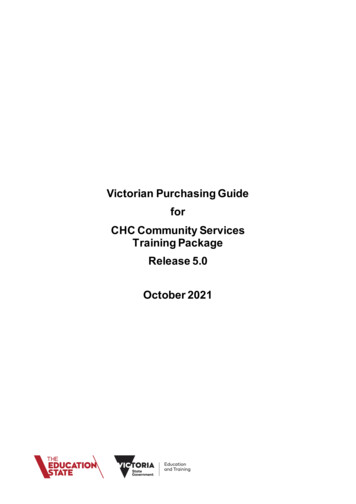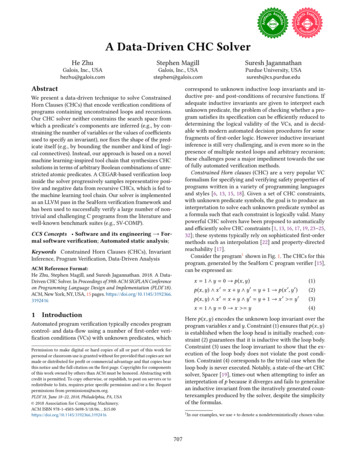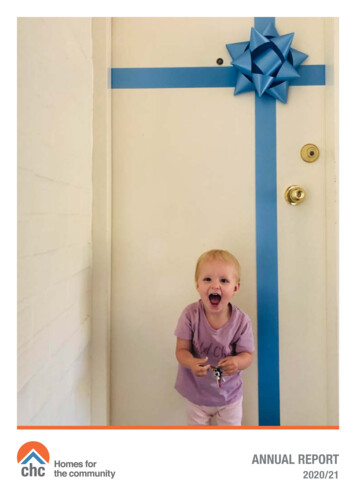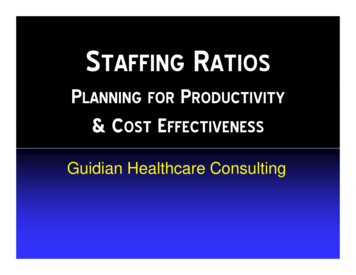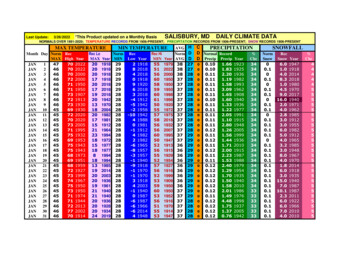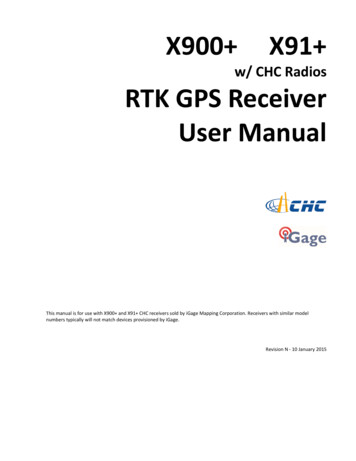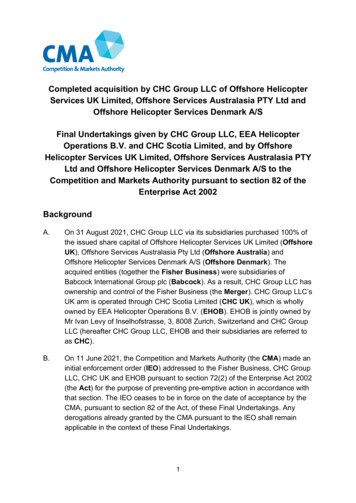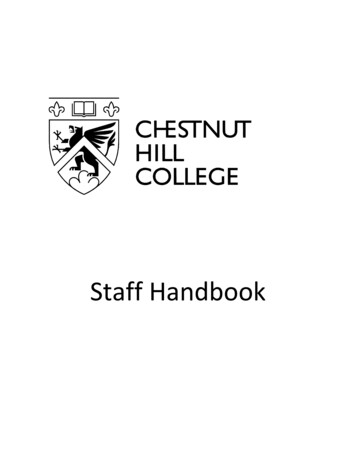
Transcription
Staff Handbook
Staff HandbookSection 1:Table of ContentsGeneral Information1.11.21.3Letter of Welcome from PresidentMission StatementHistory of the College2.12.22.32.42.52.62.72.82.92.102.11Handbook PurposeEqual Opportunity EmployerEmployment at WillIdentification CardsEmployment ClassificationsEmployment Review PeriodStandards of ConductAttendance and TimelinessPerformanceCorrective Action PlanSex Discrimination, Sexual Harassmentand Sexual ViolenceDrug Free WorkplaceNo Smoking PolicyFamily Medical Leave ActAmericans with Disabilities ActPlace of EmploymentAmorous Relationships PolicyProfessional AppearanceWhistle-blower PolicyNon-Discrimination PolicyBackground Check PolicyUse of College ResourcesFirearms, Weapons & ExplosivesPolicyStaff TeachingConfidentialitySection 2.242.25Section 3:Employment PoliciesCompensationPaid on LeaveSick LeaveLeave DonationPaid HolidaysReligious Retreat LeaveCompensatory TimePersonal LeaveBereavement LeaveJury Duty LeaveMilitary LeaveInclement 03.21Health InsuranceDental InsuranceVision InsuranceLife InsuranceLong-Term DisabilityShort-Term DisabilityRetirement BenefitTuition GrantFlexible Spending AccountsEmployee Assistance Program (EAP)3.223.233.243.253.26Salary PlanOvertime for Non-Exempt EmployeesPayroll and Paycheck DistributionTimekeepingTravel Time Pay4.14.24.34.44.5Tuition ExchangeStaff Position OpeningsSalarySection 4.4.64.74.84.94.104.114.12Section 5.5.15.25.35.45.55.65.75.85.95.105.115.12Other Policies & ProceduresStudent EmployeesCampus Crisis Management Plan andSecurity AlertsParkingMinors on CampusChild Protective ServicesPolicy on PoliciesRetention and Management ofCollege RecordsNon-FMLA Medical Leave of AbsencePersonal Leave of AbsenceFormsJob Description FormRequest for Approval of PositionRegular Hours – Non-ExemptEmployeesNon-Exempt Employee TimekeepingFormExempt Employee Timekeeping FormHourly Employee TimesheetPart Time Employee TimesheetFederal Work Study TimesheetStudent Employee TimesheetApplication for Tuition GrantEmployee Data RecordW-4 Form
SECTION 1:GENERAL INFORMATION
OFFICE OF THE PRESIDENTThis edition of the Staff Handbook replaces all previous editions and may be used as a reference forall non-faculty employees of the College. The format of the Handbook itself indicates that it is aliving document, designed to accommodate the revision and development of policies on an ongoingbasis. An ongoing review and revision of policiesThe Handbook is meant to serve as an easy reference to answer questions you may have aboutemployment policies and benefits, among other things, and has been prepared to set forth thepersonnel policies and procedures of Chestnut Hill College. Accordingly, the Handbook representsonly the general guidelines and philosophy of the College. This handbook is not a contract ofemployment and nothing in this Handbook should be viewed as changing the “at-will’ employmentrelationship which exists between the College and each employee.Please note that supervisory or other management personnel do not have the authority to alter anypersonnel policies, benefits or procedures as they are described in this Handbook or to makepromises or commitments that conflict with or are at variance with this Handbook.This manual accurately reflects current policy, but it is the expectation that policies and procedureswill continue to evolve.Very truly yours,Carol Jean Vale, SSJ, Ph.D.President
Chestnut Hill CollegeMission StatementTHE MISSION OF CHESTNUT HILL COLLEGE IS TO PROVIDE STUDENTS WITH HOLISTIC EDUCATION IN ANINCLUSIVE CATHOLIC COMMUNITY MARKED BY ACADEMIC EXCELLENCE, SHARED RESPONSIBILITY,PERSONAL AND PROFESSIONAL GROWTH, SERVICE TO ONE ANOTHER AND TO THE GLOBAL COMMUNITY,AND CONCERN FOR THE EARTH.Chestnut Hill College, founded by the Sisters of Saint Joseph in 1924, is an independent, Catholicinstitution that fosters equality through education. Faithful to its strong liberal arts tradition,Chestnut Hill College offers academic programs of excellence in the areas of undergraduate,graduate, and continuing studies.True to its Catholic heritage, Chestnut Hill College espouses the beliefs and values inherent in theJudeo-Christian tradition while it respects the contributions made by other faith traditions in thedevelopment of the whole person. The College nurtures a sense of integrity, spirituality, and socialjustice in all.The College community dedicates itself to four purposes in fulfilling this mission. It seeks: to provide avenues for students to achieve academic excellence and to pursue research intheir major field or in interdisciplinary studies. The College encourages students to exploreand experience diverse curricula and to participate in exchange programs with otherinstitutions of higher education.to initiate links between the world of learning and the world of work through curricularplanning, technological opportunities, and career preparation. The College guides studentsin applying theoretical learning through experiential education designed collaboratively byfaculty and students.to uphold an atmosphere of communal respect in which all may clarify and articulatepersonal values and beliefs while exploring the ethical and moral dimensions underlying allrelationships. The College encourages inter-faith opportunities by acquainting all studentswith Catholicism, its theology and its Judeo-Christian roots, and by engaging in dialogue withwomen and men of other beliefs.to create local and global connections that enable students to respond to the needs ofothers through service-oriented enterprises. The College educates students to identify andto address issues of social justice and to work toward systemic change.Approved by the Chestnut Hill College Board of Directors October 7, 2002.
Chestnut Hill CollegeCore ValuesWe Value Personal and Professional Growth throughout the Community.We Strive To Live This Value By: maintaining a lively forum for intellectual and artistic pursuits on campus;promoting intellectual sharing and development through inter-disciplinary programs and theencouragement of mentoring relationships;exploring avenues for growth and learning outside the campus boundaries.We Value Academic Excellence.We Strive To Live This Value By: offering a rigorous and challenging academic program with a global emphasis;expecting students to take active responsibility for their education;fostering close student-teacher bonds;ongoing assessment of academic programs.We Value Ethical Principles.We Strive To Live This Value By: including ethics across the curriculum;practicing fairness to all;living according to ethical standards and codes of behavior;addressing appropriately breaches of ethical standards.We Value Catholic Intellectual Tradition, History, and Legacy.We Strive to Live This Value By: keeping alive the mission and charisma of the Sisters of Saint Joseph*;offering sacramental preparation through campus ministry;providing opportunities to participate in Catholic liturgy;inviting dialogue on issues pertaining to human dignity, social, and economic justice, andstewardship of the environment;promoting on-going interpretations of core theological values and contemporary needs.
We Value Spirituality.We Strive To Live This Value By: embracing the ideal of spiritual growth and expression;exploring the spiritual domain of human existence and integrating this into the totality of ourexperience;seeking to explore and to understand the world’s religious traditions.*We live and work so that all people may be united with God and with one another. The mission of unity rests on the charism ofreconciliation.We Value Service.We Strive To Live This Value By: fostering an attitude of generosity in service;providing opportunities for experiential and holistic community service on campus and in thebroader community.We Value Concern for the Earth.We Strive To Live This Value By: keeping informed and educated about environmental issues;being mindful of the impact that we, as individuals and as a community, have on theenvironment;continuing to work to preserve and enhance the natural environment of the campus;accepting our responsibility as stewards of the earth and its resources.We Value Holistic Pursuit of Truth, Integrity, and Justice.We Strive To Live This Value By: reflecting these virtues in our everyday lives;applying these virtues as guides to our decision-making individually and as a community.We Value Inclusive Community.We Strive To Live This Value By: affirming human dignity as an absolute value;celebrating one another’s potential and achievements, both great and small;fostering a friendly and open atmosphere, where all are welcome;exhibiting respect for all members of the global community.
History of Chestnut Hill CollegeLocated at the northwestern edge of Philadelphia on 75 acres overlooking the Wissahickon Creek,Chestnut Hill College opened in 1924 as a Catholic, four-year, Liberal Arts College for women.Founded as Mount Saint Joseph College by the Sisters of Saint Joseph, the College was renamed in1938 as Chestnut Hill College.Since its inception, the College has offered a rigorous liberal arts education that provides studentswith a broad background in the humanities, social sciences, and natural sciences. The goal ofChestnut Hill College has been to prepare students for life's challenges by helping them to growintellectually, spiritually, emotionally, and socially.In keeping with the spirit of the Sisters of Saint Joseph, the curriculum has been modified over timeto meet the ever-changing needs of higher education and society. The College originally awardedonly the Bachelor of Arts and Bachelor of Science degrees to young women of traditional collegeage. In 1972 a Continuing Education department extended opportunities for undergraduate study tomature women and men. With the addition of a coeducational graduate program in 1980, theCollege began to offer master's degrees and, in 1997, added its first doctoral program. Today,students may earn master's degrees in six fields and a doctorate in clinical psychology.Academic changes also included expanding beyond the physical limits of the campus. As a memberof SEPCHE (Southeastern Pennsylvania Consortium for Higher Education), Chestnut Hill pursues acollaborative approach to higher education with seven other local institutions. Through membershipin the ACSSJ (Association of Colleges of Sisters of St. Joseph) Chestnut Hill is able to offer its studentsopportunities to enrich their educational experiences by studying at seven other colleges in theUnited States. Study-abroad programs further extend the reach of a Chestnut Hill education andhelp to prepare students for life in a global society.November 2001 proved to be an historic time for Chestnut Hill College. The announcement thatmen would be admitted to the traditional-age, full-time undergraduate program in fall 2003 markedthe end of the 78-year-old College for Women. In choosing to pursue this new direction, the Collegemakes a tradition of excellence and a history of success available to a wider audience.The Chestnut Hill campus provides an atmosphere conducive to teaching, learning, and reflectionfor the entire college community. The decades of expansion in academic programs were matchedby corresponding growth and change in the campus, which is listed on the National Register ofHistoric Places. For many years the main buildings were St. Joseph Hall, with its six-story GrecoRoman rotunda and French Gothic exterior, Fournier Hall, a jewel of Italian Romanesquearchitecture, and Clement Hall, with its classrooms and modest athletic facilities, including aswimming pool. The additions of the Science Building, Logue Library, Fontbonne Hall, and BarbaraD'Iorio Martino Hall meet the needs of a growing college community. In the fall of 2006, MaryJackson Fitzsimmons '35 Hall opened as a residence hall to help alleviate a housing shortage on the
campus.Each new structure was carefully designed to preserve the architectural integrity of the campuswhile addressing specific educational or student life needs. The last decade has seen an emphasison providing the technology that is essential to today's students. Renovated science facilities andcomputer laboratories helped to create a teaching/learning environment appropriate for the 21stcentury. Martino Hall includes "smart" classrooms and seminar rooms that are part of the campuswide interactive network. Visitors to the grounds have long enjoyed the grotto with its charmingfountain, the House of Loretto, and the elegant main chapel that was inspired by Sainte Chapelle inParis.On August 2, 2006, College President Carol Jean Vale, SSJ, Ph.D. announced one of the mosttransformational moments in the College's history, the acquisition of the SugarLoaf estate from theAlbert M. Greenfield Foundation for the purchase price of 11 million. SugarLoaf Hill, a 30-acreproperty situated diagonally across Germantown Avenue from the College's existing campus,offered the College a once-in-a-lifetime opportunity to nearly double the size of its campus andallow for expansion to accommodate a growing student body. In the short term, existing structuresat SugarLoaf will provide "swing space" as buildings on the main campus are prepared for adaptivere-use and renovation. Long-term, the property will provide space for additional residential andacademic buildings. This acquisition also enables the College to avoid additional construction on theexisting campus thus preserving its remaining open space.More than 10,000 individuals have earned degrees from Chestnut Hill College since 1924. The list ofaccomplished graduates includes numerous representatives in medicine, law, research, education,business and social service workers. The alumnae and alumni are also well known for theircommitment to volunteerism in countless civic, cultural, educational, and religious organizations.Their spirit continues to animate the campus through the generous support of and dedication totheir alma mater that they loyally demonstrate.Faithful to its rich history, Chestnut Hill College will continue to meet the challenges of a changingsociety while maintaining its commitment to values-oriented education and its Catholic heritage.Future graduates of the College will continue to be people who use their education to transform theworld as they join their predecessors in dedicating themselves to the College motto of Fides,Caritas, Scientia.
SECTION 2:EMPLOYMENT POLICIES
CHESTNUT HILL COLLEGESubject:Handbook PurposePolicy:2.1Effective:July 1, 1999Reviewed August 5, 2015Contact: VPFAThis handbook is designed to serve Chestnut Hill College’s non-faculty employees, whom wecollectively refer to as staff by providing a written reference regarding College policies, procedures andbenefits. As such written reference it is important to note that all policies, procedures and benefitscontained herein are subject to change at any time due to College needs and/or applicablefederal/state regulations. While the College will normally attempt to provide employees with advancenotice of changes, it reserves the right to alter the policy and/or procedure at any time withoutadvance notice. Additions to this handbook may also be made, and will be distributed to all staffmembers when formally approved.Nothing contained in the handbook or any verbal statement should be construed as creating any typeof employment contract, either express or implied. Nothing contained in this handbook is intended toprovide or guarantee employment for any specific period of time.
CHESTNUT HILL COLLEGESubject:Equal Opportunity EmployerPolicy:2.2Effective:July 1, 1999Revised December 5, 2011Reviewed August 5, 2015Contact: VPFAChestnut Hill College is an equal opportunity employer and no person will be discriminated against inemployment, including recruitment, hiring, promotion, termination or forms of compensation or onany other terms of employment. Discrimination on the basis of any of the following is prohibited:race, ethnicity, color, religion, sex, sexual orientation, gender identity, national origin, age, maritalstatus, familial status, disability, or status as a veteran. Chestnut Hill College follows the June, 2011,Fair Practices Ordinance of the City of Philadelphia (9-1100) as well as other local, state, and federallaws.See also Policy 2.20 Non-Discrimination Policy.
CHESTNUT HILL COLLEGESubject:Employment at WillPolicy:2.3Effective:July 1999Reviewed August 5, 2015Contact: VPFAAn “at will” relationship exists between Chestnut Hill College and each employee. Both the employeeand the College may terminate the employment relationship at any time for any lawful reason or forno reason at all.
CHESTNUT HILL COLLEGESubject:Identification CardsPolicy:2.4Effective:March 2003Revised August 12, 2015Contact: VPFAAll College employees are provided with an Identification (ID) Card. Employees are required to wear aCHC photo ID at all times.Replacements of lost ID cards are subject to a 10 charge.
CHESTNUT HILL COLLEGESubject:Employment ClassificationsPolicy:2.5Effective:March 1, 2003March 31, 2017Contact: VPFAUpon hire, employment is assigned a category and positions are assigned a classification.Chestnut Hill College considers three categories of non-academic/instructional employees:Full-TimeA full-time employee is one who is employed a minimum of 30 hours per week and whose scheduleextends to 52 weeks per year.Part-TimeA part-time employee is one who is employed a minimum of 20 hours per week but less than 30 hoursper week and whose schedule extends to 52 weeks per year.TemporaryA temporary employee is one who is engaged to work for a period of fewer than 52 weeks per year.The term of employment has a definite beginning and ending date, specified at the time ofemployment.These staff category definitions will be used whenever it is necessary to determine employee status foreligibility in a College Benefit program or with regard to a College Policy.In addition to the above categories, the College considers two classifications of positions by one of thefollowing definitions in accordance with the Fair Labor Standards Act. Classifying a position as nonexempt or exempt is determined by the Human Resources Office.Non-ExemptPositions are not exempt from minimum wage and overtime pay regulations covered by the Fair LaborStandards Act (FLSA). These positions include clerical, administrative support, uniformed personneland similar positions that do not meet the requirements for the exemption as defined by the FLSA.Employees classified in non-exempt positions are eligible for overtime pay and are required to keeptime records. Refer to Policy 3.23 Overtime Pay for Non-Exempt Employees.
ExemptPositions are exempt from the minimum wage and overtime pay regulations of the Fair LaborStandards Act (FLSA). These positions, which include executive, managerial and professional positionsmust meet the requirements of the exemption. Employees in exempt positions are not eligible forovertime pay.
CHESTNUT HILL COLLEGESubject:Employment Review PeriodPolicy:2.6Effective:March 1, 2004Reviewed August 5, 2015Contact: VPFAAny person newly hired into a staff position, including employees transferred or promoted into a newposition, serves an Employment Review Period of ninety (90) calendar days beginning the first day onthe job. During this period the employee may establish their ability to perform the assigned workduties and responsibilities of the position and the College will monitor the employee to establishwhether the employee can perform the essential duties of the position.The College, at any time during the initial ninety (90) day Employment Review Period, may terminateemployment for any reason with or without notice and/or extend the Employment Review Period.The Employment Review Period does not guarantee employment with the College for any specificperiod of time nor does it in any way alter the Employment at Will relationship.Supervisors will attempt to meet with employees at least once during the Employment Review Periodto discuss the employee’s progress and performance.Employees are not eligible to use Personal Leave, Sick Leave or Vacation Leave during the EmploymentReview Period. The College’s Policy on Corrective Action Plans does not apply to employees during theEmployment Review Period.
CHESTNUT HILL COLLEGESubject:Standards of ConductPolicy:2.7Effective:April 1, 2003Revised July 1, 2014Contact: VPFAChestnut Hill College expects all members of the campus community to conduct themselves in aprofessional, collegial manner in the fulfillment of all of the obligations of their institutional roles andin all interactions related to their work. In particular, each person should interact with others in amanner that is congruent with the College’s mission. For example, it is expected that all members ofthe College Community act in a professional and civil manner, contribute to the smooth operation ofthe College and its departments, treat one another respectfully and refrain from behaviors that couldbe interpreted as bullying or harassing, care for College property, and uphold the reputation of theCollege.This policy applies to all employees who work directly or indirectly for the College, including faculty,staff, and administrators. Other, more specific policies may provide details about the application ofthis general policy for particular groups. Alleged acts of discrimination based upon sex, which includessexual harassment or sexual violence are covered by the Policy on Sexual harassment and SexualViolence and are to be addressed under that Policy. Employees are also expected to follow theestablished policies and procedures of their departments and the College. This policy provides aprotocol for responding to concerns about conduct, whether or not addressed by other policies of theCollege, in a fair and orderly manner and is intended to support civility and collegial relationships atChestnut Hill College. In addition, this policy provides an effective and flexible means of identifyingproblem areas, resolving complaints, and preventing repetitive incidents by prompt intervention andassistance It is directed toward continual institutional improvement.The College recognizes that while there can be serious violations of professional responsibilitiesresulting in possible recommendation for suspension or dismissal, many personal and professionalproblems may be rectified by dialog and informal educational processes.The College has a responsibility to respond to concerns about professional conduct and workingrelationships. Concerns brought to the attention of supervisors will ordinarily be addressed by a seriesof gradual steps involving strategies to resolve issues that have been identified. For example, the stepsmay include personal conferences, verbal and written warnings, and opportunities for assistancewhere applicable. When these steps are not warranted because of the seriousness of a violation, orwhen they do not result in a satisfactory resolution, individuals may be subject to suspension,probation, and/or dismissal.
CHESTNUT HILL COLLEGESubject:Attendance and Timeliness PolicyPolicy:2.8Effective:October 1, 2009Contact: VPFAEmployees of Chestnut Hill College are expected and required to report to work on a regular and timelybasis.Work DayIn general, the regular workday for full time staff employees is 8:30 a.m. to 4:30 p.m. or 9:00 a.m. to5:00 p.m. Some offices or positions have hours based on an alternate schedule to meetstudent/College needs; employees with alternate schedules will be informed by their supervisor.The workday for full time staff employees is up to eight hours long and includes a one-hour, paid lunchperiod. There are no paid break periods built into the workday.Part time staff employees will be informed of their schedule by their supervisor.Alternative WorkdayAn alternative workday can be approved by a supervisor for an employee that temporarily may need toadjust their work schedule. The guidelines for an alternative work schedule are as follows: The employee must work a 5-day, 40-hour, Monday-Friday, work week. The employee must continue to serve both our internal and external constituents. There must be a defined period of time ( 3-month period, etc.) approved by thesupervisor and area Vice President and on file in the Human Resources Office. The employee must fill out the Alternative Workday request form so show how the timewill be allocated. ( i.e. retrieving phone messages, attending to department needs, etc.)AttendanceIf you must be absent from work, you are required to call to report your absence to your supervisoreach day. You should notify your supervisor or department head as soon as possible, but never laterthan the time you would normally report for work or within an hour of that time in cases ofemergency.Time missed from work, excluding absences covered under other College policies (e.g., sick leave), willbe considered in terms of occurrences. An excessive number of occurrences is unacceptable and mayresult in corrective action as outlined in the Corrective Action Policy.
Employees who do not report for work or notify their supervisor for three or more consecutivescheduled work periods will be considered to have abandoned their position and the position will beposted as open.TimelinessLateness occurs when an employee does not adhere to a previously agreed upon work schedule. Withthe approval of your supervisor, you may vary your work schedule from time to time. In addition, yoursupervisor may require you to change your work schedule to better support the needs of the College.Excessive lateness is unacceptable and may result in corrective action as outlined in the CorrectiveAction Policy.
Alternative WorkdayREQUEST/AUTHORIZATION FORMNameDepartmentSupervisorEffective dateEnd datePurposed Schedule:Non-Exempt alternative hours:Start TimeStartLunchEnd LunchEndTimeMONTUESWEDTHURSFRITotal:Exempt alternative schedule:I request that my schedule be adjusted to the following:Proposed start time:Proposed end time:Explanation:TOTALHOURS
CHESTNUT HILL ember 10, 2007Revised August 5, 2015Contact: VPFAStaff employees at Chestnut Hill College are expected to maintain a satisfactory level of performanceon the job. As a representative of the College, appearance and conduct must be such that it reflectsfavorably upon the organization.Staff employees will be evaluated on an ongoing basis to ensure that performance meets the standardof excellence that is required by Chestnut Hill College. Your performance evaluation will be basedupon the duties and requirements in the job description, as well as goals and objectives set for theposition by, or in consultation with, the supervisor.Written performance appraisals will be completed and reviewed with the employee toward the end ofthe Employment Review Period (see Policy 2.7) and then on an annual basis. The format of theperformance appraisal system is consistent college wide.The Performance Evaluation Process provides an opportunity for supervisors and their staff to: Align individual and departmental goals and objectives with the College's Mission, Core Valuesand Strategic PlanAlign personal goals and objectives so that the employee can perform to the best of his/herabilityClearly outline expectations of the employeeProvide meaningful feedback to the employeeNote: At this time, performance evaluations will not be directly linked to compensation. This mayoccur at a future date to be determined.
CHESTNUT HILL COLLEGESubject:Corrective Action PlanPolicy:2.10Effective:March 1, 2003Contact: VPFAEmployees of Chestnut Hill College are expected to abide by the established rules and policies of theCollege, including, but not limited to, those outlined in the Standards of Conduct, Timeliness andAttendance Policy and Performance Policy. The College provides employees who violate policies orexhibit unsatisfactory job performance an opportunity to comply with College requirements by meansof a progressive discipline policy or Corrective Action Plan.A Corrective Action Plan is a series of disciplinary actions, corrective in nature, taken to provideemployees the opportunity to improve job performance and comply with College rules and policies.Such actions range from counseling/coaching, oral and written warnings, probation or suspension, todischarge, as deemed appropriate to the situation.Before implementing a Corrective Action Plan, a supervisor should first consult with his or her Director,Dean or Vice President, and then with the Vice President of Financial Affairs. The Vice President ofFinancial Affairs is responsible for the proper handling of such matters, including the assurance thatappropriate action is taken when circumstances warrant.The supervisor, with the assistance of the Vice President of Financial Affairs, will also determinewhether the particular violations are serious enough to warrant immediate specific disciplinarymeasures outside of progressive discipline, including discharge. “Serious Violations” include, but arenot limited to, those acts that could result in injury, impairment of the College’s operations, or loss ordamage to College’s resources. Any behavior or action not congruous with the College Mission is alsoconsidered a “serious violation.”The College reserves the right to skip one or more of the progressive discipline steps dependent uponthe situation.
Corrective Action Procedures Counseling/Coaching is the most common method employed for assisting the employee toimprove work performance or comply with rules and policies. This should be
3.3 Paid Holidays 3.4 Religious Retreat Leave 3.5 Compensatory Time 3.6 Personal Leave 3.7 Bereavement Leave 3.8 3.9 Jury Duty Leave 3.10 Military Leave
